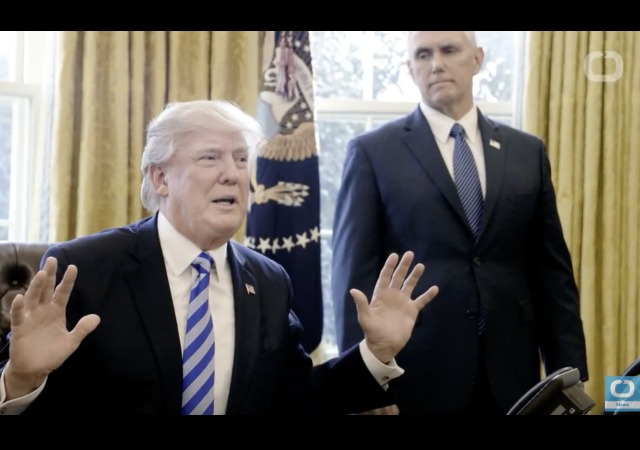Trump to Include Dodd-Frank, Taxes in Latest Executive Order
The order includes reviewing top parts of Dodd-Frank.

President Donald Trump will sign an executive order for Treasury Secretary Steven Mnuchin to target financial regulations from former President Barack Obama that have caused companies trouble to conduct business.
Mnuchin has said that the orders from Trump “are meant to emphasize the administration’s economic priorities to the American people.” This includes parts of the Dodd-Frank Act and tax regulations handed out in 2016.
From Reuters:
A White House official said on Thursday that Trump will issue an executive order directing the Treasury on the tax issues. He will also issue two memoranda asking for reviews of two parts of the 2010 Dodd-Frank Wall Street reform law – the Orderly Liquidation Authority that sets out how big banks can wind down during a crisis and the Financial Stability Oversight Council (FSOC), which is made up of the country’s top regulators.
USA Today has reported that the orders will include:
► Review significant tax regulations issued in 2016 that are overly complex and “impose an undue financial burden” on taxpayers. These could include an Obama rule to clamp down on so-called “inversions,” which allow multinational corporations to get favorable tax treatment by merging with companies in lower-taxed countries.
► Review the use of orderly liquidation authority [OLA] to bail out insolvent financial institutions, reigniting the debate over a key provision of the Dodd-Frank Wall Street Reform and Consumer Protection Act of 2010. Trump wants to re-examine whether court-supervised bankruptcy would be a better way to wind down failing banks.
► Review the process for the Financial Stability Oversight Council [FSOC] to designate non-bank financial institutions like insurance companies as “systemically important” to the financial system. Those companies are then subject to additional oversight by the Federal Reserve.
The Dodd-Frank Act developed the FSOC to determine which banks and financial firms should receive the title “too big to fail.” Republicans in Congress accuse the FSOC of using “a flawed process lacking transparency to designate non-bank institutions.” As of now only two insurance companies have the label: American International Group Inc and Prudential Financial Inc.
The act also established the OLA. This process goes through the federal government, which helps those “systematically important financial institutions” (SIFIs) “sell off their assets without triggering an economic crisis.” The OLA operates with fees from large banks and financial firms, but Republicans describe this deal a “bailout.” Like Trump, the Republicans want “to replace it with a new bankruptcy process.” The Democrats consider OLA “a safeguard against another financial crisis.”
There has been a lot of back and form over which subject the administration will tackle after it failed to even bring its healthcare reform bill to the floor for a vote. After the failure, many thought eyes would focus on tax reform. But then Trump said he wanted to focus on healthcare before tackling tax reform.
Mnuchin has said, though, that the Treasury Department continues to work on tax reform “day and night.” He hopes to have a plan “very soon” and has conducted weekly meeting with House Ways and Means Committee Chairman Kevin Brady (R-TX).
 DONATE
DONATE
Donations tax deductible
to the full extent allowed by law.








Comments
This is more than “Make America Great Again”, it is “Making America America Again”. For the globalist and “takes a community” crowd this must be SOOOO upsetting. Maybe some designated safe space should be constructed for them…. in Iran or Venezuela.
REPEAL Dodd-Frank. REPLACE with Glass-Steagal. We didn’t elect Trump to “get things done” but rather to “get things UNdone!”
May want to re-establish Glass-Steagal but is there a better option?
There is no substitute for breaking up the banksters. The main reason for repealing Glass-Steagall was to accommodate all of the international money-laundering of US dollars in CASH required for all of the drug cartel deals and capital flight from the USSR and China.
Dodd-Frank was a ponderously bureaucratic “solution” to attempting to address the many unavoidable conflicts of interest that we allowed to unite under one roof. Glass-Steagall was an excellent example of efficient regulation requiring little bureaucracy. But it stood in the way of globalist political mandates.
We did fine with “small” banks and would again if we returned to clean and honest banking. Were Glass-Steagall restored, the equity and bond markets would provide the exit gates by pricing the components logically. Shareholders might also be handed a bonanza since the economically efficient parts are worth more than the ponderously inefficient whole. Keep in mind that John D. Rockefeller acquired most of his wealth after Standard Oil was broken up. Same would happen with these banksters.
Thank Clinton for repealing Glass-Steagal.
No, thank the Republicans. The Democrats wanted to push an “ownership society” where banks would lend money to poor people regardless of credit worthiness so the uniparty combined the two issues. Without Glass-Steagall standing in the way, the banksters could then produce the toxic products required to raise the capital to fund this new society. The banks could also then pass the risk on to naive fixed income investors, pension funds, and others.
Having no skin in the game and with so much money being made on both ends (selling mortgages and toxic products), they couldn’t produce enough of either to meet demand. There is always endless demand for free money. No checks and balances. Reality tossed out the window.